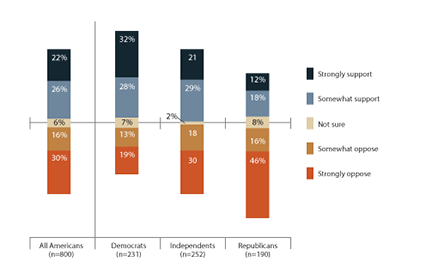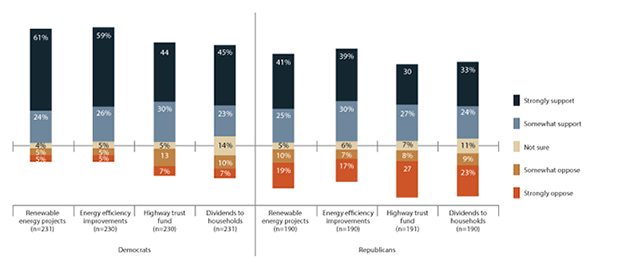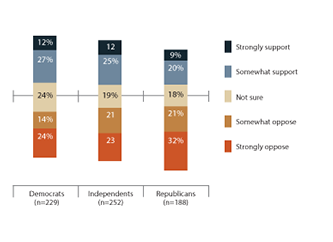A majority of Americans of both parties support a carbon tax when they are told how the revenues would be used.
A majority (60%) of Democrats say they would support a carbon tax even when they are given little information about how that tax would be designed. But the same is true of only 30% of Republicans.
However, as the NSEE has found in previous survey waves, both groups are more supportive of a carbon tax when details are given about the revenues would be used. On the Fall 2018 survey, the NSEE found majority support among both Democrats and Republicans for all four revenue use options tested.
Figure 1. Support/opposition to a federal carbon tax, by partisan identification

Question text below
Both Democrats and Republicans are more supportive of a carbon tax that would reinvest revenues in clean energy rather than return revenues directly to households.
Of the four revenue use options offered, the same two rise to the top among both Democrats and Republicans—reinvesting the revenues in either renewable energy projects or energy efficiency improvements. A carbon tax with revenues directed back into both clean energy options is supported by 85% of Democrats; among Republicans, there is 69% for a carbon tax which designates revenues toward energy efficiency and 66% for a carbon tax where revenues go towards renewable energy projects.
A carbon tax where revenues are put toward the highway trust fund to fund improvement to transportation infrastructure is supported by 74% of Democrats and 57% of Republicans. And a revenue neutral tax, in which every dollar collected was returned to household through an annual dividend payment, is supported by 68% of Democrats and 57% of Republicans.
Figure 2. Support/opposition to a carbon tax with revenue use specified, by partisan identification

Question text below
Americans are skeptical of a carbon tax in exchange for a regulatory swap.
Some have suggested that one way to make a carbon tax more appealing particularly to Republicans would be to offer a regulatory swap: that in exchange for the carbon tax, the Environmental Protection Agency be restricted in setting separate regulations on greenhouse gases. The NSEE finds limited support for such a proposal, with just 39% of Democrats and 29% of Republicans in favor. In fact, an outright majority of Republicans (53%) say they would oppose such a plan.
Figure 3. Support/opposition to a carbon tax in exchange for regulatory swap, by partisan identification

Question text below
I'm going to read off some proposed policies that would help reduce greenhouse gas emissions. For each idea that I mention please tell me if you strongly support, somewhat support, somewhat oppose, or strongly oppose the proposed ways to reduce greenhouse gas emissions.
First, the federal government increasing taxes on carbon based fuels such as coal, oil and natural gas. Would you strongly support, somewhat support, somewhat oppose, or strongly oppose such a tax?
What if the carbon tax was passed in exchange for restricting the ability of the Environmental Protection Agency to set separate regulations on greenhouse gases? Would you strongly support, somewhat support, somewhat oppose, or strongly oppose such a system?
What if the carbon tax was “revenue neutral,” meaning every dollar collected were returned to households through an annual dividend payment? Would you strongly support, somewhat support, somewhat oppose, or strongly oppose such a system?
What if the revenue from the carbon tax was put into the highway trust fund to fund improvements to transportation infrastructure? Would you strongly support, somewhat support, somewhat oppose, or strongly oppose such a system
What if the revenue from the carbon tax was reinvested in energy efficiency improvements that help homes and businesses reduce their electricity use? Would you strongly support, somewhat support, somewhat oppose, or strongly oppose such a system?
What if the revenue from the carbon tax was reinvested in renewable energy projects like solar or wind energy? Would you strongly support, somewhat support, somewhat oppose, or strongly oppose such a system?
